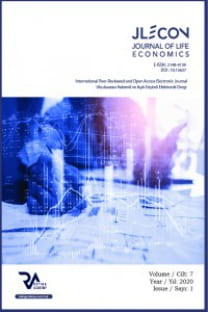ÇİN’İN KÜRESELLEŞME İÇİNDE ROLÜ: YENİ BİR HEGEMON MU?
Çin 1970’li yıllar ile başlayan dışa açılma politika uygulamaları ile giderek güçlenen bir küresel aktör rolünü üslenmektedir. Bu süreçte üretim, ticaret, inovasyon, enerji kullanımı ve ulusötesi sermaye konularında yaşadığı çarpıcı gelişmeler ve ortalama en hızlı büyüyen ülke olmanın getirdiği avantajlar neticesinde Çin’in küreselleşmede mevcut hegemonyayı ele geçirmek gibi bir niyetinin ve gücünün olup olmadığı konusu, bu makalenin ana sorusunu oluşturmaktadır. Bu nedenle makalede Çin’in işçi maliyetleri ile ortaya çıkan avantajlarının ve ülkedeki büyümenin, Lewis Dönüm Noktası (LTP) ve Orta Gelir Tuzağı kavramsal çerçevesiyle sorgulanması, özellikle küresel kriz sonrası oluşan koşullar gözönünde bulundurularak yapılmaktadır. Çalışmada, Çin’de Orta Gelir Tuzağının aşılması yolunda toplam faktör verimliliğinin arttırılması ve diğer önlemlerin yanısıra küresel kriz ve ABD-Çin Ticaret Savaşlarının Çin ekonomisine etkileri sorgulanmıştır.
Anahtar Kelimeler:
Çin, Hegemonya, Küreselleşme, Lewis Dönüm Noktası, Orta Gelir Tuzağı
THE ROLE OF CHINA IN GLOBALIZATION: A NEW HEGEMON?
China is taking on the role of a global actor that has been strengthened with the outward policy practices that started in the 1970s. The main question of this article is whether it has the intention and power to take over the current hegemony in globalization as a result of the striking developments in production, trade, innovation, energy use and transnational capital and the advantages of being the fastest growing country on average. Therefore, the question of China's labor costs and advantages and growth with the Lewis Turning Point (LTP) and the Middle Income Trap has been dealt with, in particular, taking into account the post-crisis conditions. The effects of the global crisis and the US-China trade wars on the Chinese economy were questioned, among other things, to increase the total factor productivity in overcoming the Middle Income Trap.
Keywords:
China, Hegemony, Globalization, Lewis Turning Point, Middle Income Trap,
___
- DAS, M. and N’DIAYE P., (2013), Chronicle of a Decline Foretold: Has China Reached the Lewis Turning Point?, IMF Working Paper No:13/26, ISBN:978475548242/1018-5941
- FOSTER, J.B. and MCCHESNEY R.W., (2013) Küresel Ekonomik Durgunluk ve Çin, Monthly Review,31: 112-145
- GARNAUT, R. (2010), Macro-Economic-Implications-of-the-Turning-Point, China Economic Journal 3(2) :181-190
- GILL, I. S. ve KHARAS, H. (2007), An East Asian renaissance: Ideas for economic Growth, The World Bank, ISBN-10:0-8213-6747-1, Washington DC, USA.
- GÖKTEN, K. (2012), “Çin Yüzyılını Anlamak”, Ankara: Nota Bene Yayınları, ISBN:978-605-5513-15-3
- GULUZADE, A. (2019), The Role of China's State-Owned Companies in the Trade War,World Economic Forum Global Shapers Annual Summit, 2019-05-12 https://weforum.org, [e.t. 14.10.2019]
- HANTKE, A. (2016), will-india-and-pakistan-cripple-the-sco https://thediplomat.com/2016/11/will-india-and pakistan-cripple-the-sco/Hantke
- HENNIGAN, M. (2011), China became the world's biggest manufacturer in 2010; US loses crown held since 1895, Finfacts. http://www.finfacts.ie/irishfinancenews/article_1021835.shtml
- HICKS J., and HARVEY C., (2018), 40th International Academic Conference, Stockholm ISBN 978-80-87927-67-0, IISES DOI: 10.20472/IAC.2018.040.025
- KASA, H. (2019). Tasarruf açığı ve Arge Harcamalarının Orta Gelir Tuzağına Etkileri, TESAM Akademi dergisi, Türkiye Ekonomisi Özel sayısı: 153-182.
- LARIONOVA, M.V. ve SHELEPOV, A.V., (2016), Potential Role of The Development Bank And Asian Infrastructure Investment Bank In The Global Fınancial System, Herald of PFUR, International Relations, 16(4):700-716.
- LENZER,(2011),bamboo-capitalism-in-china-the-secret-of-success https://www.forbes.com/sites/robertlenzner/2011/10/09/bamboo-capitalism-in-china-the-secret-of-success/#297490b57b4a)
- NA, L. top 10 multinational enterprises of China in 2014 http://www.china.org.cn/top10/2014-09/05/content_33430917.htm
- NUROĞLU, E. (2019), Ticaret savaşları sona mı eriyor?, aa.com.tr/analiz
- PENG, B. (2018), China, Global Governance, and Hegemony:Neo-Gramscian Perspective in the World Order, Journal of China And International Relations ,6(1): 48-72
- REISEN, H. (2015), Will the AIIB and the NDB Help Reform Multilateral Development Banking?, Global Policy, Wiley, Hoboken, 6(3): 297-304
- SHAH, R. (2012), What is 'Lewis turning point' and its importance for China, https://economictimes.indiatimes.com/news
- TRAN, V.T. (2013), The Middle-Income Trap: Issues for Members of the Association of Southeast Asian Nations, ADBI Working Paper No: 421. Tokyo: Asian Development Bank Institute. Available: http://www.adbi.org/working-paper/2013/05/16/5667.middle.income.trap.issues.asean/
- WATTS,J.,(2010).china-overtakes-us-energy-consumer https://www.theguardian.com/environment/2010/aug/03/china-overtakes-us-energy-consumer, [e.t. 05.12.2019]
- WANG, H. (2019), The New Development Bank and the Asian Infrastructure Investment Bank: China’s Ambiguous Approach to Global Financial Governance Development_and_Change https://www.wita.org/wp-content/uploads/2019/02/Wang-2019, [e.t.15.12.2019]
- WANG, X. and WEAVER N., (2013), Surplus Labour and Lewis Turning Points in China, Journal of Chinese Economic and Business Studies, 11(1): 1-12
- Global Innovation Index (2019), Creating Healthy Lives- The Future of Medical Innovation, ISBN 979-10-95870-14-2, Geneva
- International Monetary Fund World Economic Outlook Uneven Growth Short and Long Term Factors, April-2015, ISSN 0256-6877, International Monetary Fund Publication Services, Washington DC
- Trade And Development Report (2019), ISBN 978-92-1-112953-3,United Nations Publication, Newyork, USA
- UNCTAD WIR (2018), United Nations Publication, ISBN 978-92-1-112926-7, Geneva
- Made in China? https://www.economist.com/leaders/2015/03/12/made-in-china, [e.t. 20.11.2019]
- Çin'in ilk açık küresel yönetişim fikri 14 Ekim 2015 http://www.xinhuanet.com//world/2015-10/14/c_1116824064.htm [e.t. 04.10.2019]
- http://statisticstimes.com/economy/world-gdp-ranking-ppp.php [e.t. 09.12.2019]
- China unveils new list of top 500 enterprises, http://govt.chinadaily.com.cn/a/201909/01/WS5d6c8439498ebcb1905790a4.html imf.org/en/News/Articles/2019/08/09/na080919-chinas-economic-outlook-in-six-charts [e.t. 12.09.2019]
- China economy: Annual growth slowest since 1990, bbc.com/news/business-46941932 [e.t.17.10.2019]
- Fortune Global500 (2019), fortune.com/global500/2019/ [e.t. 01.10.2019]
- Lessons from outperformers, https://www.mckinsey.com.mgi-outperformers-full-report-sep-2018.ashx [e.t. 01.10.2019]
- China’s 2013 exports rise 7.9%, imports up 7.3%, chinadaily.com.cn/business/2014-01/10content_17229362.htm [e.t. 01.11.2019]
- Yayın Aralığı: Yılda 4 Sayı
- Başlangıç: 2014
- Yayıncı: Rating Academy
Sayıdaki Diğer Makaleler
KÜRESEL SORUNLAR EKONOMİK KRİZLERİN ULUSLARARASI YANSIMALARI
TAYLOR KURALI MEKANİZMASINA BENZER ŞEKİLDE BİR MEKANİZMA İNŞASI ÇABASI: BİST-100 ÜZERİNE SINAMALAR
Hatıra SADEGHZADEH EMSEN, Ömer Selçuk EMSEN, Ömer YALÇINKAYA
ÇİN’İN KÜRESELLEŞME İÇİNDE ROLÜ: YENİ BİR HEGEMON MU?
İrvan TRANG, Sri MURNI, Lisbeth MANANEKE
ÇOK ULUSLU ŞİRKETLER, STRATEJİLERİ VE KÜRESELLEŞMEDEKİ ROLLERİ
ISTANBUL HOUSING AND LAND APPRAISAL SYSTEM REFORM DEVELOPMENT PROCESS AND PROPERTY VALUES ANALYSIS
THE INFLUENTIAL POWER AND THE IMPORTANCE OF MUSIC IN ADVERTISING AND MARKETING
